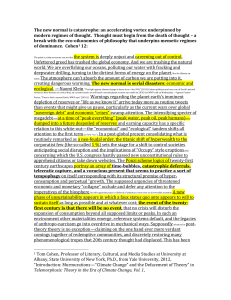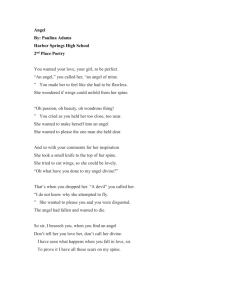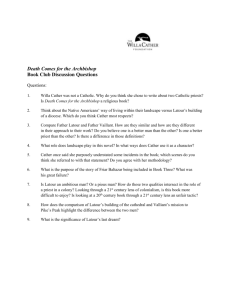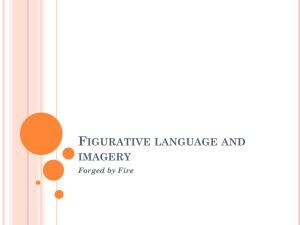Subjectivity K Telemorphosis
advertisement
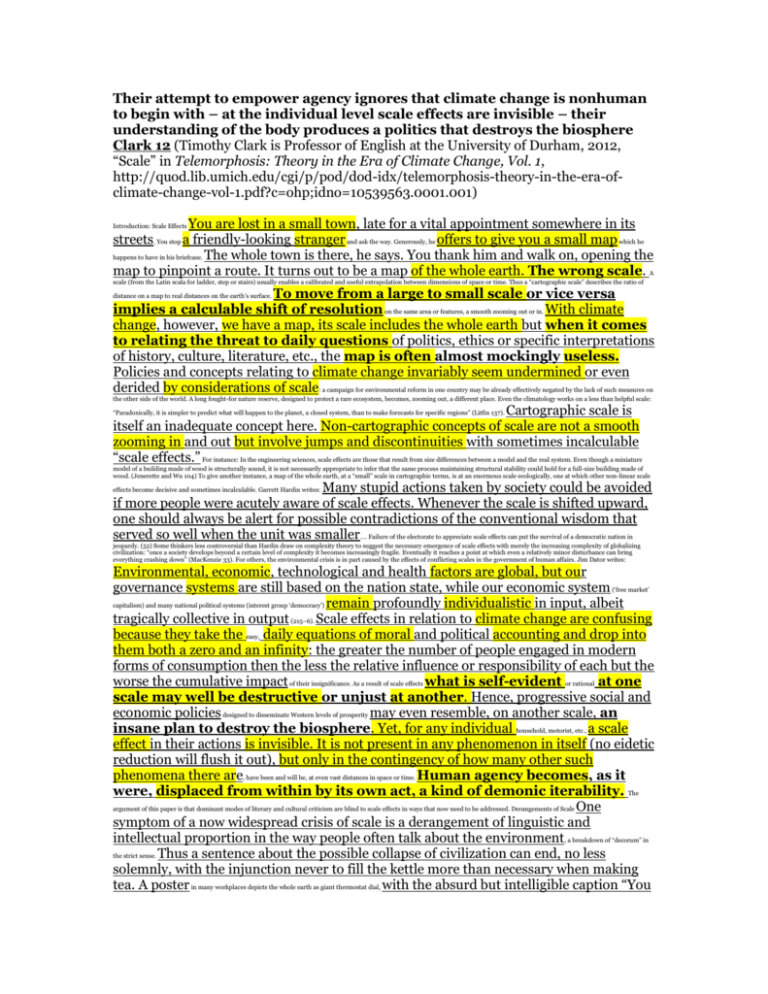
Their attempt to empower agency ignores that climate change is nonhuman to begin with – at the individual level scale effects are invisible – their understanding of the body produces a politics that destroys the biosphere Clark 12 (Timothy Clark is Professor of English at the University of Durham, 2012, “Scale” in Telemorphosis: Theory in the Era of Climate Change, Vol. 1, http://quod.lib.umich.edu/cgi/p/pod/dod-idx/telemorphosis-theory-in-the-era-ofclimate-change-vol-1.pdf?c=ohp;idno=10539563.0001.001) You are lost in a small town, late for a vital appointment somewhere in its streets. You stop a friendly-looking stranger and ask the way. Generously, he offers to give you a small map which he happens to have in his briefcase. The whole town is there, he says. You thank him and walk on, opening the map to pinpoint a route. It turns out to be a map of the whole earth. The wrong scale. A Introduction: Scale Effects scale (from the Latin scala for ladder, step or stairs) usually enables a calibrated and useful extrapolation between dimensions of space or time. Thus a “cartographic scale” describes the ratio of To move from a large to small scale or vice versa implies a calculable shift of resolution on the same area or features, a smooth zooming out or in. With climate change, however, we have a map, its scale includes the whole earth but when it comes to relating the threat to daily questions of politics, ethics or specific interpretations of history, culture, literature, etc., the map is often almost mockingly useless. Policies and concepts relating to climate change invariably seem undermined or even derided by considerations of scale: a campaign for environmental reform in one country may be already effectively negated by the lack of such measures on distance on a map to real distances on the earth’s surface. the other side of the world. A long fought-for nature reserve, designed to protect a rare ecosystem, becomes, zooming out, a different place. Even the climatology works on a less than helpful scale: Cartographic scale is itself an inadequate concept here. Non-cartographic concepts of scale are not a smooth zooming in and out but involve jumps and discontinuities with sometimes incalculable “scale effects.” For instance: In the engineering sciences, scale effects are those that result from size differences between a model and the real system. Even though a miniature “Paradoxically, it is simpler to predict what will happen to the planet, a closed system, than to make forecasts for specific regions” (Litfin 137). model of a building made of wood is structurally sound, it is not necessarily appropriate to infer that the same process maintaining structural stability could hold for a full-size building made of wood. (Jenerette and Wu 104) To give another instance, a map of the whole earth, at a “small” scale in cartographic terms, is at an enormous scale ecologically, one at which other non-linear scale Many stupid actions taken by society could be avoided if more people were acutely aware of scale effects. Whenever the scale is shifted upward, one should always be alert for possible contradictions of the conventional wisdom that served so well when the unit was smaller…. Failure of the electorate to appreciate scale effects can put the survival of a democratic nation in effects become decisive and sometimes incalculable. Garrett Hardin writes: jeopardy. (52) Some thinkers less controversial than Hardin draw on complexity theory to suggest the necessary emergence of scale effects with merely the increasing complexity of globalizing civilization: “once a society develops beyond a certain level of complexity it becomes increasingly fragile. Eventually it reaches a point at which even a relatively minor disturbance can bring everything crashing down” (MacKenzie 33). For others, the environmental crisis is in part caused by the effects of conflicting scales in the government of human affairs. Jim Dator writes: Environmental, economic, technological and health factors are global, but our governance systems are still based on the nation state, while our economic system (‘free market’ capitalism) and many national political systems (interest group ‘democracy’) remain profoundly individualistic in input, albeit tragically collective in output (215–6). Scale effects in relation to climate change are confusing because they take the easy, daily equations of moral and political accounting and drop into them both a zero and an infinity: the greater the number of people engaged in modern forms of consumption then the less the relative influence or responsibility of each but the worse the cumulative impact of their insignificance. As a result of scale effects what is self-evident or rational at one scale may well be destructive or unjust at another. Hence, progressive social and economic policies designed to disseminate Western levels of prosperity may even resemble, on another scale, an insane plan to destroy the biosphere. Yet, for any individual household, motorist, etc., a scale effect in their actions is invisible. It is not present in any phenomenon in itself (no eidetic reduction will flush it out), but only in the contingency of how many other such phenomena there are, have been and will be, at even vast distances in space or time. Human agency becomes, as it were, displaced from within by its own act, a kind of demonic iterability. The argument of this paper is that dominant modes of literary and cultural criticism are blind to scale effects in ways that now need to be addressed. Derangements of Scale One symptom of a now widespread crisis of scale is a derangement of linguistic and intellectual proportion in the way people often talk about the environment, a breakdown of “decorum” in the strict sense. Thus a sentence about the possible collapse of civilization can end, no less solemnly, with the injunction never to fill the kettle more than necessary when making tea. A poster in many workplaces depicts the whole earth as giant thermostat dial, with the absurd but intelligible caption “You control climate change.” A motorist buying a slightly less destructive make of car is now “saving the planet.” These deranged jumps in scale and fantasies of agency may recall rhetoric associated with the atomic bomb in the 1950s and after. Maurice Blanchot argued then that talk of humanity having power over the whole earth, or being able to “destroy itself,” was deeply misleading. “Humanity” is not some grand mega-subject or unitary agent in the sense this trope implies. In practice such destruction would certainly not be some sort of consciously performed act of self-harm, “humanity destroying itself.” It would be as arbitrary as was “the turtle that fell from the sky” and crushed the head of Aeschylus (Blanchot 106). The almost nonsensical rhetoric of environmental slogans makes Blanchot’s point even more forcefully. Received concepts of agency , rationality and responsibility are being strained or even begin to fall apart in a bewildering generalizing of the political that can make even filling a kettle as public an act as voting. The very notion of a “carbon footprint” alters the distinctions of public and private built into the foundations of the modern liberal state. Normally, demands in a political context to face the future take the form of some rousing call to regained authenticity, whether personal, cultural or national, and they reinforce given norms of morality or responsibility, with an enhanced sense of determination and purpose. With climate change this is not the case. Here a barely calculable nonhuman agency brings about a general but unfocused sense of delegitimation and uncertainty, a confusion of previously clear arenas of action or concepts of equity; boundaries between the scientific and the political become newly uncertain, the distinction between the state and civil society less clear, and once normal procedures and modes of understanding begin to resemble dubious modes of political, ethical and intellectual containment. Even a great deal of environmental criticism, modeling itself on kinds of progressive oppositional politics and trying (like Murray Bookchin’s “social ecology”) to explain environmental degradation by reference solely to human-to-human hierarchies and oppressions can look like an evasion of the need to accord to the nonhuman a disconcerting agency of its own. The environmental crisis also questions given boundaries between intellectual disciplines. The daily news confirms repeatedly the impossibility of reducing many environmental issues to any one coherent problem, dysfunction, or injustice. Overpopulation and atmospheric pollution, for instance, form social, moral, political, medical, technical, ethical and “animal rights” issues, all at once. If that tired term “the environment” has often seemed too vague—for it means, ultimately, “everything”—yet the difficulty of conceptualizing a politics of climate change may be precisely that of having to think “everything at once”. The overall force is of an implosion of scales, implicating seemingly trivial or small actions with enormous stakes while intellectual boundaries and lines of demarcation fold in upon each other. The inundation of received intellectual boundaries and the horror of many probable future scenarios has the deranging effect, for instance, of making deeply unsure which of the following two statements is finally the more responsible—(1) “climate change is now acknowledged as a legitimate and serious concern and the government will continue to support measures to improve the fuel efficiency of motor vehicles” or (2) “the only defensible relationship to have with a car is with a well aimed brick”? [1] The new normal is catastrophe: fracking, drilling, warming, sovereign debt, inequality, hyper-consumption, planetary extinction – their nostalgic agenda for a praxis of bodies and genuine feeling only accelerates this. Cohen 12 (Tom Cohen, Professor of Literary, Cultural, and Media Studies at University at Albany, State University of New York, Ph.D., from Yale University, 2012, “Introduction: Murmurations—“Climate Change” and the Defacement of Theory” in Telemorphosis: Theory in the Era of Climate Change, Vol. 1, http://quod.lib.umich.edu/cgi/p/pod/dod-idx/telemorphosis-theory-in-the-era-ofclimate-change-vol-1.pdf?c=ohp;idno=10539563.0001.001) the system is deeply unjust and careening out of control. Unfettered greed has trashed the global economy. And we are trashing the natural world. We are The point is, today everyone can see that overfishing our oceans, polluting our water with fracking and deepwater drilling, turning to the dirtiest forms of energy on the planet, like the Alberta tar sands. The atmosphere can’t absorb the amount of carbon we are putting into it, creating dangerous warming. The new normal is serial disasters: economic and ecological. —Naomi Klein, “The fight against climate change is down to us—the 99%” [2011] Carbon pollution and over-use of Earth’s natural resources have become so critical that, on current trends, we will need a second planet to meet our needs by 2030, Warnings regarding the planet earth’s imminent depletion of reserves or “life as we know it” arrive today more as routine tweets than events that might give us pause, particularly as the current wars over global “sovereign debt” and economic “crises” swamp attention. The intensifying specter of megadebt—at a time of “peak everything” (peak water, peak oil, peak humans)—dumped into a future despoiled of reserves and earning capacity has a specific relation to this white-out—the “economical” and “ecological” tandem shifts all attention to the first term (or first “eco”). In a post-global present consolidating what is routinely remarked as a neo-feudal order, the titanic shift of hyperwealth to the corporatist few (the so-called 1 %) sets the stage for a shift to control societies anticipating social disruption and the implications of “Occupy” style eruptions—concerning which the U.S. congress hastily passed new unconstitutional rules to apprehend citizens or take down websites. The Ponzi scheme logics of twenty-first century earthscapes portray an array of time-bubbles, catastrophic deferrals, telecratic capture, and a voracious present that seems to practice a sort of tempophagy on itself corresponding with its structural premise of hyper-consumption and perpetual “growth. The supposed urgencies of threatened economic and monetary “collapse” occlude and defer any attention to the imperatives of the biosphere, but this apparent pause or deferral of attention covers over an irreversible mutation. A new phase of unsustainability appears in which a faux status quo ante appears to will to sustain itself as long as possible and at whatever cost; the event of the twenty-first century is that there will be no event, that no crisis will disturb the expansion of consumption beyond all supposed limits or peaks. In such an environment other materialities emerge, reference systems default, and the legacies of anthropo-narcissm go into overdrive in mechanical ways. Supposedly advanced or post-theory theory is no exception—claiming on the one hand ever more verdant comings together of redemptive communities, and discretely restoring many phenomenological tropes that 20th century thought had displaced. This has been characterized as an unfolding eco-eco disaster—a complex at once economic and ecological. [1] The logics of the double oikos appear, today, caught in a self-feeding default. The present volume, in diverse ways, reclaims a certain violence that has seemed occluded or anaesthetized (it is a “present,” after all, palpably beyond “tipping points” yet shy of their fully arrived implications—hence the pop proliferation of “zombie” metaphors: zombie banks, zombie politics, zombie “theory”). It departs from a problem inherent in the “eco” as a metaphoric complex, that of the home (oikos), and the suicidal fashion in which this supposed proper ground recuperates itself from a non-existent position. The figure of an ecology that is ours and that must be saved precludes us from confronting the displacement and dispossession which conditions all production, including the production of homelands. Memory regimes have insistently, silently and anonymously prolonged and defended the the WWF said on Wednesday. —Agence France-Presse, “Time to find a second Earth, WWF says” [2010] 1. construct of “homeland security” (both in its political sense, and in the epistemological sense of being secure in our modes of cognition), but these systems of security have in fact accelerated the vortices of ecocatastrophic imaginaries. This leads to what can be called the zone of telemorphosis: that is, how and whether conceptual practices and cognitive rituals, including those of critical theory, have participated in the production of these horizons, and what, today, breaks with that. If a double logic of eco-eco disaster overlaps with the epoch in deep time geologists now refer to as the “anthropocene,” what critical re-orientations, today, contest what has been characterized as a collective blind or psychotic foreclosure? Nor can one place the blame at the feet alone of an accidental and evil ‘1%’ of corporate culture alone, since an old style revolutionary model does not emerge from this exitless network of systems. More interesting is the way that ‘theory’, with its nostalgic agendas for a properly political world of genuine praxis or feeling has been complicit in its fashion. How might one read the implicit, unseen collaboration that critical agendas coming out of twentieth century master-texts unwittingly maintained with the accelerated trajectories in question? The mesmerizing fixation with cultural histories, the ethics of “others,” the enhancement of subjectivities, “human rights” and institutions of power not only partook of this occlusion but ‘we theorists’ have deferred addressing biospheric collapse, mass extinction events, or the implications of resource wars and “population” culling. It is our sense of justified propriety—our defense of cultures, affects, bodies and others—that allows us to remain secure in our homeland, unaware of all the ruses that maintain that spurious home. Vote negative to disoccupy the political and theoretical space opened by the affirmative – this act of disidentification is a prerequisite to revealing the violent implications of all forms of subjectivity formation in the context of climate change Cohen 2 (Tom Cohen, Professor of Literary, Cultural, and Media Studies at University at Albany, State University of New York, Ph.D., from Yale University, 2012, “Introduction: Murmurations—“Climate Change” and the Defacement of Theory” in Telemorphosis: Theory in the Era of Climate Change, Vol. 1, http://quod.lib.umich.edu/cgi/p/pod/dod-idx/telemorphosis-theory-in-the-era-ofclimate-change-vol-1.pdf?c=ohp;idno=10539563.0001.001) The rapacious present places the hidden metaphoric levers of the eco or oikos in an unsustainable exponential curve, compounding megadebt upon itself, and consuming futures in what has been portrayed as a sort of psychotic trance—what Hillis Miller calls, in this volume, a suicidal “auto-co-immunity” track. [2] Yet the “Sovereign debt crisis” corresponds to a credibility crisis as well. The latter applies not only to the political classes of the post-democratic klepto-telecracies of the West but seems to taint the critical concepts, agendas, and terms received from twentieth-century itineraries that accompanied the last decades and that persist as currency. Far from opening beyond the propriety of the oikos theories of affect, living labor and critical legacies have doubled down on their investments, created guilds as reluctant as Wall St. to give up cognitive capital. All the while there is attention paid to ‘saving’ the humanities or a critical industry that might be extended the very pre-occupation with human on human histories, culturalism, archivism, and the institutions of power were complicit with a larger blind that, in his view, the ecological crisis belatedly discloses. [3] At the moment of writing it is common to point to the 2011 “occupy” movement, viral and cloud-like, as the Bartlebyesque counter to a totalization of the systems of this control. Bartleby has become the figure for a rejection of end-fixated production. Were one able to speak of an occupy movement applied to critical concepts and twentieth century derived idioms one might imagine a call to occupy critical theory and conceptual networks—but with what interruption of received programs (“Sovereign debt”), what alternative materialities, what purported “ethics” involving commodified futures (and the structure of debt), what mnemotechnics, and with resistance to what power, if it is the oikos itself, the metaphoric chimera and its capture of late anthropocene imaginaries that is at issue? This is one of the implications of what this volume terms telemorphosis, the intricacy by which referential regimes, memory, and reading, participate in these twenty-first century disclosures. The occupy motif, at the moment, sets itself against a totalization or experience of foreclosure—political, mediacratic, financial, cognitive. Various strategies appearing in this volume involve what could equally be called a disoccupy logic or meme. Such a logic of disoccupation assumes that the domain in question is already saturated, occupied in the militarist sense by a program that, unwittingly, persists in the acceleration of destruction and takeover. Critical thought of recent decades would have walked hand in hand with the current foreclosures. The explication of ecocatastrophic logics, accordingly, are not found in Foucault nor, surprisingly, for a while longer (as if with “sovereignty” itself). Bruno Latour [2010] presumes to call this recent and ongoing episode the “Modernist parenthesis” of thought. In his conjecture, Derrida. Timothy Morton’s Ecology without Nature is one such effort at disoccupation—seeking to void the two terms of the title, and in the process disrupt the “revised organicisms” of contemporary critical schools which, he argues, have managed to lapse into sophisticated precritical modes not unrelated to a more general inertia. The meme of disoccupation resonates, for instance, with what Robert Markley in this volume proposes as a practice of “disidentification,” and is implied by Timothy Clark’s tracking of a “derangement of scale” in the perpetual cognitive disjunctures that come up against the ecocatastrophic present. One would disoccupy the figure of subjectivity, refusing not only the comforting commodifications of “the other” in cultural theory, but also [and] the later moral appeals to other redemptive beings, such as the animal (as Joanna Zylinska argues with regard to post-humanism and its “animal studies”). What might be disoccupied would be the metaphorics of the home, even where the latter would sustain itself today in cherished terms like trauma, affect, alterity, embodiment, or even culture. Yet a refusal of supposed redemptive ‘outsides’ to capitalism does not lead to a place of critical purity beyond the implied moralism of ‘occupy’ but the return of, and orientation to, a violence before which no model of sovereignty can be sustained. To imagine that one might disoccupy by refusing all the supposed redemptive ‘outsides’ to capitalism is not to find a place of critical purity beyond the moralism of ‘occupy.’ Occupation is never simply takeover and appropriation, but always involves destruction of what it claims. The viral migration of the “occupy” motif involves a premise of disoccupation covertly. In the present volume this takes different forms. If one is now beyond tipping points in a zone of irreversibility, what corresponds to this as a critical injunction? Catherine Malabou sets aside the entire way the figure of trauma and the “always already” has organized time. Claire Colebrook affirms, rather than accepting as tragic, extinction as a point of departure for thought, which can be used to work against the organicist ideologies of the present (such as sexual difference). Martin McQuillan shifts the referential spectrum of discourse to “other materialities” in the hypothesis of a post-carbon thought, while Robert Markley tracks the influx of geological times that displace human narrative matrices. Bernard Stiegler voids the biopolitical model, which he sees as exceeded by “the third limit of Capitalism” (when it impinges on the biosphere). From that point of excess he strategizes a counter-stroke to the capture of attention by telecratic circuits, initiating a noopolitics. Joana Zylinska disoccupies, to continue this motif, the covert model of soft “otherness” by which animal studies has invented itself as an anthropo-colonianism. Like post-humanism generally, Zylinska argues, animal studies sustains its subjectal hegemonies. Hillis Miller locates a source for the ecocatastrophic imaginary in the blind insistence of “organicist” models of reading that sustain the comforts of the oikos. Against this hermeneutics of security Miller posits an “ecotechnics” that is at once machinal and linguistically based (where language is not communicative, but literal and inscriptive in a manner exemplified by Kafka’s Odradek). Justin Read displaces any biopolitical model, again, by relinquishing trauma, the oikos, survival and interiorities of any manner, instead describing the circulation of data (or the “unicity”) from which the only remaining political gesture would be oriented to the ecocatrastrophic. Jason Groves shifts the referential screen from, again, a human-centered index to the viral textualism of (alien) species invasion, the global rewriting of bio-geographies. Mike Hill transitions to the alteration of atmospherics under the imaginary of climate war technologies in a new horizon of invisible wars (and wars on visibility), which today include not only nanotechnologies but also the “autogenic” turning of wars without discrete (national) enemies into suicidal rages against the “homeland”—a sort of, again, auto-occupation that is accelerating. Absent a critique of mnemotechnics, any knowledge or skill we gain from this debate is forgotten – progressive politics has been consumed by the psychosis of corporate design, epistemic prerequisite to their arguments. Cohen 3: Bruno Latour, as observed above, offered a curious fable in which he identifies what he calls the “Modernist parenthesis” as the default mode of thought that The twentieth century focus on “critique” that would be transfixed with reading and rewriting its own chaotic histories would have walked hand in hand with the unfolding impasse to terrestrial life. Latour’s “Modernist parenthesis” includes the very project of critique and a pre-occupation with the past at the expense of addressing the past’s now exponentially accelerated consequences. Latour—whose speculation departs from a painfully Gaiesque reading of the film Avatar—proposes that, as part of any reset today, the term materiality ought to be retired as part of a faux binary. He also recommends jettisoning the term “future”, which he would replace with the ratcheted down and humbled term “prospects.” The label “Modernist parenthesis” is an intriguing trope. It resonates with a accompanied the disclosure of an ecocatastrophic horizon. term like the “anthropocene” that can only, it implies, be pronounced in a future past tense which the speaker would inhabit. What might reading be if we were already looking back at our present, from a future that we cannot yet allow? Latour seems unaware to what degree he inscribes himself in this specular construction, both by his use of the retro-organicism of the Gaia metaphor and his premise, a signature of the “modernist” gameboard, of announcing a temporal break and new beginning, the revolutionary hypothesis of his imagined “parenthesis.” It is thus reluctantly that he finds his way back to a canonical twentieth century text, the “tired… trope” of Benjamin’s Angel of History to make his point: I want to argue that there might have been some misunderstanding, during the Modernist parenthesis, about the very direction of the flow of time. I have this strange fantasy that the modernist hero never actually looked toward the future but always to the past, the archaic past that he was fleeing in terror. […] I don’t wish to embrace Walter Benjamin’s tired “Angel of History” trope, but there is something right in the position he attributed to the angel: it looks backward and not ahead. “Where we see the appearance of a chain of events, he sees one single the Modern who, like the angel, is flying backward is actually not seeing the destruction; He is generating it in his flight since it occurs behind His back! It is only recently, by a sudden conversion, a metanoia of sorts, that He has suddenly realized how much catastrophe His development has left behind him. The ecological crisis is nothing but the sudden turning around of someone who had actually never before looked into the future, so busy was He extricating Himself from a horrible past. There is something Oedipal in this hero fleeing His past so fiercely that He cannot realize—except too late—that it is precisely His flight that has created the destruction He was trying to avoid in the first place. [Latour 2010: 485– catastrophe, which unceasingly piles rubble on top of rubble and hurls it before his feet.” But contrary to Benjamin’s interpretation, 6] This default appeal to Oedipus is perhaps too quick. Latour creatively misreads the “tired… trope” of an Angel who is, in Benjamin’s text, already something of a charlatan. The Angel is thoroughly impotent, aware of the scam of what the undead masses expect of him (to make them whole). “He” can’t give the undead masses and debris of history, turned toward him, what they want but lingers, as if wanting to, until he is simply torn away by what is called a “storm from the future.” This last angel is but the ragdoll of a certain angelicism—not just the costumed human face (with wings) imposed on the sign as messenger, here of no message, but the entire will to redemption narratives that his very form signifies. The text reads differently if one focuses on the word in Benjamin’s text, “storm,” which is repeated three times as the subject of three declarative sentences. It is a climactic term and subsequently indexed to what Thesis XVIII invokes as the aeons of organic life on earth within which human time appears as fractional seconds (an “anthropocene” perspective). Benjamin’s so-called Angel of History is in fact a vaudevillian figure and not the avatar of the hero, the materialist historiographer. He embodies and destroys both the angelicism of an utopist Marxian and the theotropes of a Cabbalist—the two specular idioms which the Theses fuses in order to cancel one another out. The description of the Angel is so abdicating, deceptive, and suicidal (one can imagine him diving for a cigarette as he looks at the masses) that it nullifies, in advance, the project of materialistic historiography. It also cancels any “weak messianism”—or any messianism whatsoever. The Angel is shown as a con, held to his post by his expectant readership who still wants to be made whole. It will never be clear whether the Angel only thinks this is what is wanted of him, or if the undead masses think he wants them to want this. He is the last trace of anthropopism, dolled up as a human figure to mediate chance. When he is torn away by the “storm” he removes the anthropo-narcissm of angelicism, the lure of giving matter a human form, face and, in this case, betraying bird wings. He is the last personification of a human face plastered on an imaginary other, already a wire-framed incandescent in Klee’s graphic deconstruction. He mimes and is dismissed as the sort of “weak messianism” that Benjamin elsewhere pretends to evoke—and which Derrida will return to, and try to use to keep a rhetoric of the future open (the trope of an impossible “democracy to come”). In this way, the Derrida of Specters of Marx regresses from Benjamin’s destructive project by restituting the phrase “weak messianism.” Derrida’s omission of ecocatastrophic logics from his otherwise compendious agenda—for instance, nowhere to be found in Specters’ “ten plagues” of the new world order—echoes elsewhere in an archival limit he seemed to require for “deconstruction” to rhetorically stage itself. It is not that Benjamin’s Angel trope is about fixation on the past—as archive, trace, histories of power, identity formations, narratives of justice, inscriptions—and hence ritual or time management. It is that “He” thinks that’s what his readers seek in him, and he both gestures toward wanting to oblige (with, say, weak messianism?) and effectively gets out of dodge. Benjamin’s Angel is given to us as a sort of con: knowing what his readership needs and hires him for (since “He” is the messenger of no revelation and reports to no god, is nothing but sign itself), He wants to help but is violently blown away. This lure of redemptive history is about angelicism tout court, its reflex or façade, the compulsion to reconstitute and to be reassured (even sanctified). The trompe l’oeil points not only to where this faux Angel is in costume as the last anthropomorphic form and face. (He looks human, is more or less male traditionally). It also points to the disappearance of the pretended mediation of an otherwise void sign (angel as messenger, as hermeneut). It gives the lie to a certain pretense to ethics, and to cognitive moralisms, and indicates a participation of angelicism in a more radical evil of which it The impulse toward angelicism pervades the recycling of twentieth century critical idioms in sophisticated variations. And this systemic relapse, like the Nachkonstruction of an oikos whose non-existence would accelerate its militarized defense, itself appears to further a suicidal arc. This new angelicism, like what Timothy Morton [2007] calls “revised organicisms,” merits suspicion. It is opportunistic to note where various critical traditions is, adamantly, structurally, and violently unaware. of return and redemption mingle. In a conversation between Lauren Berlant and Michael Hardt on “love” as a political agency at a conference titled “On the Commons; or, Believing-Feeling-Acting Together” we can read yet one more variant of an appeal to an angel that would make us and our past whole. Let us ignore that the commons in question for Hardt and Berlant is not water, oil, or food but the “transformative” zone of a new social “relationality” of liberal souls. “Love” here retains the soft debris and promise of a Christological meme. If for Hardt love “makes central the role of affect within the political sphere,” for Berlant a more aggressive claim erupts: Another way to think about your metaphor, Michael, is that in order to make a muscle you have to rip your tendons. I often talk about love as one of the few places where people actually admit they want to become different. And so it’s like change without trauma, but it’s not change without instability. It’s change without guarantees, without knowing what the other side of it is, because it’s entering into relationality. The thing I like about love as a concept for the possibility of the social, is that love always means non-sovereignty. Love is always about violating your own attachment to your intentionality, without being antiintentional. [Davis and Sarlin 2011] Perhaps the metaphorical faux pas about “tendons” being ripped is a clue to the skeletal argument (this is not, literally not, the way to build muscle). What one witnesses is the effect of doubling down in the idiom of commitment (“change without trauma”?), a closing off, as academics of a certain age and temperament murmur, narcissistically, about affect. One has found a new name for the oscillation that retains a sovereignty of intentionality under Sometimes, as we hear, it’s just not about us, even where self-love is called the commons and projects a socio-union, or jouissance, beyond the confines of a dubious “collective” individualism. Perhaps this is one marker of an end of a cycle, this fusion of critical and culturalist idioms, returning to a redeeming origin—this time as “farce.” This sort of eddy appears as the comfort spa for what could be called academic theory’s “Lehman moment.” 5. What is interesting in the horizons converging at present is not how a certain irreversibility impacts or is excluded still by telecracies and cognitive regimes. Nor is the main point of interest how sophisticated critical agendas have discretely served an agenda of institutional inertia—especially in the guise of critique. What is interesting is not the shape this will take, the variable catastrophes that are calculable or envisioned. What should be interesting is a logic of foreclosure or psychosis that has become, in part, normatized, accommodated or confirmed by corporate media. [9] This psychosis takes the form of excluding, occluding, or denying what is fully in the open and palpable, whether in science or before one’s eyes. Latour assumes a shifted algorithm: “Love is always about violating your own attachment to your intentionality, without being anti-intentional.” that a “Modernist parenthesis” erred by its assiduous focus on rereading the past otherwise, but he misses the target of Benjamin’s cartoon. It is not attention to the past but rather angelicism that constitutes a violent hermeneutic relapse. Perhaps an example of Latour’s paralyzing ‘parenthesis’ would be Derrida’s injunction against thinking the “future” in order to keep open the incalculable and the “to come.” In fact, the current plunge in economic and societal “prospects”—lost “sovereignty,” debt enslavement, banker occupation, collapse of reserves, and so on—is not premised on an undue focus on the past but is all about alternative time-lines. In this respect Latour’s “prospects” run into the same capture of futures that occurs in the market, whether manipulated from above to defer reckoning Calculations about future events, the forward narratives that flood media and alternative journalism, suggest a time in which the commodification of the “past” has flipped forward—marking both past and future as fantasmatic projections. One is not, so to speak, nor have we been, outside of “literary” constructions, least of all when we say something like system or reserves. What is called the market, now technically rogue in the sense that it serves as a façade of manipulations to play for time, is all about bets on future circumstance. Expanded to commodified futures and derivatives, and credit default swaps; wired through ingenious and self-imploding “financial instruments”—said market parallels the global despoilment of future reserves and times (generations). It would be indulgent to run through variations of this. Some are familiar: the consolidation of a new form of totalitarianism and internal security apparatuses; new climate war technologies (applied internally) testing the “full spectrum dominance” protocols that the Pentagon retains as its post-imperial template (which Mike Hill explores in this volume). Some are becoming visible: untimed prognoses of biospheric collapse (marine food chains), extreme weather disasters (mega-drought, flooding, fracking induced quakes). Others hover at the edge of recognizability: mass extinction events, the mathematics of global population “culling.” These nonetheless, like (the “too big to fail” logic) or bet against. hydo-carbons and oil itself, literally shape visibility and invisibility—no oil, no hyper-industrial techno-culture, no photography as we know it, no cinema, no global transport. Is there an imperative, as Martin McQuillan suggests, to rethink the histories of writing and cognition in relation to carbon and hydrocarbon culture explicity—and to do so not only in relation to human mnemo-technologies? When Claire Colebrook converts extinction from a tragic taboo to an affirmative The problem is not that the past draws human narcissism toward it in the latter’s critical revisionism and deconstructions; the problem is that the more active “other temporalities” intervene, the more the artefacted present appears spellbound. perspective she deflates the semantic boundedness that any angelicism has always sought to save. The recourse to modern conception of rights ensures that the aff’s call for environmental justice obfuscates the problematic methodological frame and risks REIFYING systems of thought that make unfair environmental distribution and exclusion thinkable Clark ’10:1 (3) The outmoded quest for a ‘liberatory’ method. Environmental questions are plural, cross-disciplinary, contentious and often mutually contradictory. The defining terms ‘environment’ or ‘environmentalism’ seem less coherent concepts than loose containers for all kinds of issues that do not fit given modes of the desire for some intellectual certainty in their stance has led to many ecocritics reaching for familiar modernist categories. Greg Garrard describes the general stance of twenty-first ecocriticism as tending towards ‘social ecology,’33 that is , towards arguments that human violence against the natural world is ultimately a product of oppressive structures of hierarchy in the human species.34 In effect, environmental issues can be held to be addressed by engaging questions of equity among human beings. Thus it is today that, while some environmental thinkers confront directly the difficult question politics. It is perhaps not surprising then that of clashes between specific environmental issues and the ideals and norms of inherited thought (e.g. in liberalism), the majority of eco- critical arguments now draw primarily on models of thinking taken from oppositional politics in the modern, progressive/enlightenment tradition. This general stance has been accompanied with an increased attention to questions of environmental justice, ‘the right of all people to share equally in the benefits bestowed by a healthy environment,’35 raising such important issues as environmental racism, the elitism of the mainstream environmental politics, and environmental The environmental justice movement invokes visions of a just society linked in part to the impetus of American civil rights struggle. health as a matter of social justice. Picking up this agenda in the late 1990s, ecocriticism gained rhetorical appeal by seeming to extend the terms of that movement to environmental concerns. Mapping environmental politics onto the more familiar human justice agenda has also had some short term intellectual advantages: critics can also bring to bear all the well-used tools of mainstream cultural criticism, following its familiar method of focusing on competing social ‘constructions’ of an issue in terms of various interests and exclusions. A distinction of green criticism becomes simply that it is competing constructions of the environment that are being gauged. Ecocriticism thus rebutted earlier accusations of a romantic anti-intellectualism and of the sacralisation of ‘wilderness’ to gain more immediate . Climate change, however, may mark the closure or exhaustion of modes of environmental politics embedded in the modernist, liberal tradition. Val Plumwood writes that ‘the green movement still lacks a coherent liberatory theory,’36 but the blockage may be perhaps to posit such a simplistic theoretical goal in the first place. As a possible global catastrophe arising from innumerable mostly trivial or innocent individual actions, including some which seem politically taboo, such as increased material prosperity, an expanding population or increased longevity, climate change does not present any one easily identifiable antagonist. Its causes are diffuse, partly unpredictable and separated from their effects by huge gaps in space and time. Climate change entangles itself with other environmental problems that seem to present no acceptable solution — the demands, for instance, of an expanding population for new and safely inhabitable space as against the claims to preservation of the habitats of increasingly scarce animals or plants. Can western eco-critics comfortably inhabit a stance from which to engage the environmental political relevance, at least in relation to specifically human, local grievances degradation latent in the hopes of millions of people in the Far East planning to buy a first car? James Garvey writes: ‘In a more than token sense, a campaign of civic disobedience undertaken for meaningful action on climate change is nothing other than campaign by us, against us.’37 Another danger is that the to voice environmental justice in the usual terms of a demand for equitable ‘inclusion’ is effectively to legitimise the centre from which people claim to be excluded, i.e. not to offer an alternative account of the social good but only to second demands for a fairer distribution of the spoils (‘the right of all people to share equally in the benefits bestowed by a healthy environment’). Whatever its strength in addressing local grievances, eco-criticism thus becomes the covert legitimation of consumer democracy. tendency (Timothy, Prof of English Studies, Durham University, “Some Climate Change Ironies: Deconstruction, Environmental Politics and the Closure of Ecocriticism”, Oxford Literary Review, 32 (1)) 1 On Case The global relations of power the aff describes have their roots in the view of individuals as consumable. Only the alt can solve. Ziarek 122: One of the key vectors of this “planetary” availability which Heidegger diagnoses, running always in parallel to the availability of the planet as a total reserve standing at the ready, is availability for consumption, that is, availability to be capitalized for production, reproduction, commodification, and consumption. In his timely L’indemne: Heidegger et la destruction du monde, Frédéric Neyrat proposes to think of Heidegger’s explanation of the generalized—global or planetary—consumability on the to be in modernity comes to mean to be consumable: not in essence open to being consumed and replacable: ontological level, which suggests precisely that just provided for consumption but , as such, whether as resource, product, commodity, service, etc. In order to be consumable, a good needs to be constituted as replaceable in its essence. The narrower consumption associated with the consumption of commodities in capitalism and consumerist culture becomes possible by way of this ontological consumability and illustrates the degree to which sense of capital today is adept at increasingly capitalizing and exploiting this constitutional consumability of being. It is this conception of availability to consumption that, as Neyrat indicates, can provide an interesting avenue for a philosophical critique of capital beyond socio-economic explanations and yet integrating and contextualizing them within the planetary operations of power sketched out by Heidegger and increasingly discussed in today’s approaches: from Foucault and Deleuze to Negri, Agamben, or Esposito. In “Overcoming Metaphysics,” a collection of fragments gathered over several years and published in 1955 (Heidegger Controversy 67–90), Heidegger makes his reflection on the possibility of the experience of the world pivot precisely on the question of consummability, thought in tandem with the notion of availability. I would differ on this point from Neyrat and point out that for Heidegger it is availability that allows for and explains consumability and not the other way round. It is because beings come to be as intrinsically dispose-able, that is, both “at the disposal” of power, available to it and open to its manipulative thrust, and also disposable, replaceable and consumable through the processes of power. Dispose-able: being at and therefore as easily disposable as available. The standing reserve indicates a seamless extension of availability into replacability, of consumption into disposing of and reproduction. Writing about consumption in the context of armament and war, Heidegger remarks: The consumption of beings is such and in its course determined by armament in the metaphysical sense, through which man makes himself the ‘master’ of what is ‘elemental.’ The consumption [Verbrauch] includes the ordered use [Gebrauch] of beings which become the opportunity and the material for feats and their escalation The world wars are the antecedent form of the removal of the difference between war and peace. This removal is necessary since the ‘world’ has become an unworld [Unwelt] as a consequence of the abandonment of beings by Being’s truth In the age of the exclusive power of power, that is, of the unconditional pressing of beings toward being used up in consumption, the world has become an unworld in that Being does presence [west], but without really reigning [ohne eigenes Walten, without the disposal (Bestand) properly holding sway]. Beings are really [effectively] as the real [Das Seiende ist wirklich as das Wirkliche.] There is effecting [Wirkung] everywhere, and nowhere is there a worlding of the world and yet, although forgotten, there is still Being. Beyond war and peace, there is the mere erring of the consumption What is necessary for the world to globalize and become available to the planetary coursing of power is the technicist revealing of beings as driving toward their being used up in consumption; in short, what marks the age of world power (whether as peace or as war) is the global availability of of beings in the plan’s self-guaranteeing in terms of the vacuum of the abandonment of Being. (84, modified) beings to consumption. Yet this revealing into being consumable marks also the turn of the world into an unworld. Since the world discloses itself as unworld, and thus discloses itself by veiling itself as world, only in the epoch of planetary power and Machenschaft, the unworld is necessarily only as a the world no longer worlds, that there is no worlding of the world, when beings manifest as a global standing reserve of resources, available as in essence dispose-able and thus ready to be consumed. We see all as disposeable resources, that is, precisely in terms of everything being available, consumable, and replaceable, rather than letting what exists be as what it is. In fact, we do not simply see or disclose beings into their availability but increasingly force them to disclose themselves as dispose-able: let’s say, the “forcing” open of the human genome, or other gene sequences, as available to manipulation, engineering, and global unworld. Put simply, Heidegger’s point is that Krzysztof. Professor of Comparative Literature at the University of Buffalo. “The Global Unworld A Meditative Manifesto” in Impasses of the Post-Global: Theory in the Era of Climate Change, ed. Henry Sussman. 2012. http://quod.lib.umich.edu/cgi/p/pod/dod-idx/impasses-of-the-post-globaltheory-in-the-era-of-climate.pdf?c=ohp;idno=10803281.0001.001 2 reproduction. We could ask, in a Heideggerian fashion, what is a human being when it is disclosed as a potentially and intrinsically manipulable sequence of genes. Is humanity first and foremost a gene pool, and is the dominance of this technicist way of revealing what being human means predetermining the question of being along the progressively calculative scale of technicist power and manipulation ?
